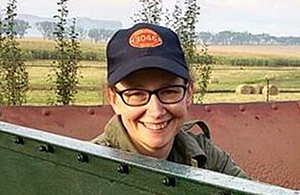Meet the team - why be an Inspector?
An inquisitive mind and and wanting to find out why things happen? These are all traits which help you as an RAIB inspector

RAIB inspector Rowan Joachim wearing casual clothes and a blue baseball cap
I joined the branch five years ago and I’ve loved it. I love forensic engineering and establishing what and why and getting lessons out and explaining to people what happened and what can be done to try and make sure whatever it was doesn’t happen again.
I was quite concerned at first that the on-call roster would be really onerous and difficult to manage with two children. The branch puts out a request for when you think you might want leave in the October for the coming year (you don’t have to stick to what you put down, but it allows the branch to avoid putting you on call during your summer holiday or if you know you have an event you want to be at). The final roster is issued around the end of October or in early November for the whole year ahead. This means that emergencies excluded you can plan your life and childcare around the roster, so it isn’t really that onerous at all. Obviously you do need to be ready to go if you are tipped out, but at least you know well in advance when that is likely to be.
In the Rail Accident Investigation Branch, we all have our areas of specialism, whether that be railway specific (engineering, operations, signalling, track, light rail rolling stock etc) or investigations, human factors or something else that you bring to the branch, but our training when we first join is such that on site we are jacks of all trades and able to handle anything. There is always support on the phone, from your colleague with you or back at the branch so you can always check and make sure you haven’t missed anything obvious. Once you are a fully-fledged inspector you may well end up training the branch in your areas of expertise, which, whilst daunting at first is a great challenge and a good way of maintaining your knowledge and keeping up to date.
Your specialist area doesn’t determine the investigations you will lead either, so you get to experience all types of railway, operations, infrastructure regardless of your background which makes everything varied and brilliant for learning.
Investigations can take you to all parts of the country and our work with other Investigation Branches and organisations means you may get to go overseas too. The opportunities to learn and improve your knowledge are endless, we are always refreshing, practising and renewing skills.
Not only do you lead investigations on site, or take an investigation through from when the decision has been made to investigate to its conclusion, report writing, recommendations and consultation, liaising with industry and all parties involved there are many other aspects of an inspector’s role. We provide training of different types to various organisations, give presentations to industry to explain who we are, what we do and why. Inspectors usually have a devolved task which means that you always have at least one regular thing you can fall back on or be doing when there is a natural break in an investigation, or you just need a change of scene!
Unsurprisingly the people in the branch are really supportive and ready to share their knowledge and experience or just to help out when needed. It’s a really important aspect given what we do.